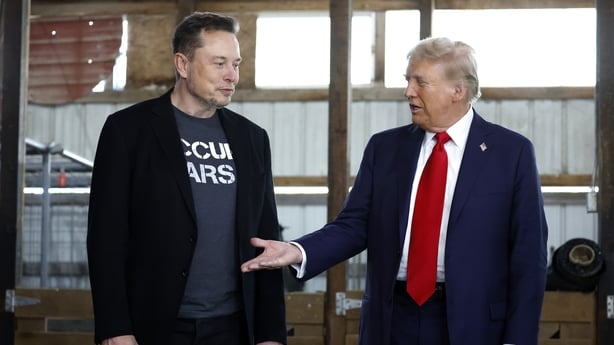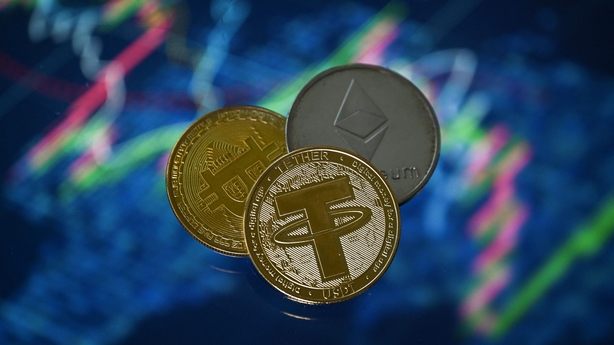Wall Street reached record highs yesterday and major stock markets around the world surged, while bitcoin hit an all time high and the dollar was set for its biggest one day jump in four years after Donald Trump was elected US president.
Trump's decisive victory pummelled long-dated Treasuries and revived the "Trump trade," as yields sank in anticipation that Trump will hike tariffs as he has promised, increasing the US deficit and inflation and causing the Federal Reserve to cut interest rates by less than it otherwise would have.
Trump, 78, recaptured the White House in Tuesday's election with resolute support, despite news reports and polls that said it was a closely contested election.
"The fact that he won so handily, and it was called so quickly, I think that was a bit of a shock to the market," said Paula Comings, head of foreign exchange sales at US Bank. "We have seen now massive rallies in risk assets."
The VIX, a measure of stocks' volatility also perceived as "Wall Street's fear gauge," dived 21% as investors celebrated in part the clarity of the election outcome.
On Wall Street, the S&P 500 index jumped 2.5%, the Dow Jonese surged 3.6%, and the Nasdaq Composite soared 3%.
Shares in electric car maker Tesla leapt 15% after Elon Musk, its billionaire CEO, emerged as one of Trump's key supporters in the final leg of his 2024 campaign.
Investors appeared to bet on Tesla's benefiting from Musk's ties with Trump, who has said he would create a government efficiency commission headed by Musk to cut federal spending.

Shares in Trump's social media company, Trump Media & Technology Group, gained 5.9% to $35.96 after surging as much as 42% overnight. The stock has approximately halved in value since hitting a record high in March.
The dollar index rallied 1.7% and was set for its best day since March 2020.
Outside the US, investors were decidedly less euphoric, weighed by concerns that higher tariffs under Trump would hurt global trade and economic growth.
The euro extended losses late in the day after German Chancellor Olaf Scholz sacked his finance minister , and said he will hold a parliamentary confidence vote in the government in January, triggering political chaos in Europe's largest economy.
European shares gave up earlier gains and fell 0.5%.
Mexico's peso sank to its weakest level in over two years.
"The market is definitely moving in line with the Trump playbook; stocks and small caps, in particular, are higher on the idea that Trump will be good for US companies," said Seema Shah, chief global strategist for Principal Asset Management in London.
"Across emerging markets, you can see China and Europe are struggling with the idea that they could face higher tariffs, and US bond yields higher with expectations for a higher fiscal deficit and inflation."
While markets were still confident the Federal Reserve would cut interest rates by 25 basis points at the closeof its two-day meeting this eveninbg, they slightly reduced bets on further easing in December.
"The big challenge for markets is that if you do see tariffs come through you need to balance the short-term nature of inflation risks with the medium-term aspect of lower growth," said Justin Onuekwusi, chief investment officer at investment firm St James's Place.
"The market appears to be thinking about inflation right now," he added.
In contrast, European government bonds rallied, and German two-year bond yields fell 11 basis points to 2.19%, while money markets priced in lower European Central Bank rates.
"For European businesses, Trump's return to the White House would mean considerable trade policy and geopolitical uncertainty, with negative implications for growth on the continent," said Berenberg chief economist Holger Schmieding.
Bitcoin emerged as one of the clear winners of the day.

The cryptocurrency climbed to a record high of $76,086 and was last up 9.6%.
Trump is seen as more actively supportive of cryptocurrencies than the Democratic candidate, Vice President Kamala Harris.
In traditional currencies, the euro was hurt by potential tariffs and the widening differential between US and Europea nrates. It was set for itsbiggest daily fall since 2016's Brexit referendum and outpacing a 1.2% fall in sterling.
The dollar jumped 2% to 154.59 Japanese yen, and gained 1.4% on the offshore yuan to 7.1969 yuan amid reports Chinese banks were selling dollars to slow the yuan's decline.
China is seen on the front line of tariff risk, and its currency in particular is trading on tenterhooks with implied volatility against the dollar around record highs.
Mexico's peso briefly dropped as low as 20.8038 per dollar for the first time since August 2022, more than 3% below its previous close - the biggest such tumble since Mexico's election in the summer roiled domestic assets.
The sharp rise in the dollar pressured oil prices, and other commodities, as it makes them more expensive when buying in other currencies.
US crude lost 0.2% to $71.83 per barrel, while Brent fell 0.6% to $75.11.
Gold prices dropped 3.1% to $2,660.22 an ounce, off a recent record peak of $2,790.15.

